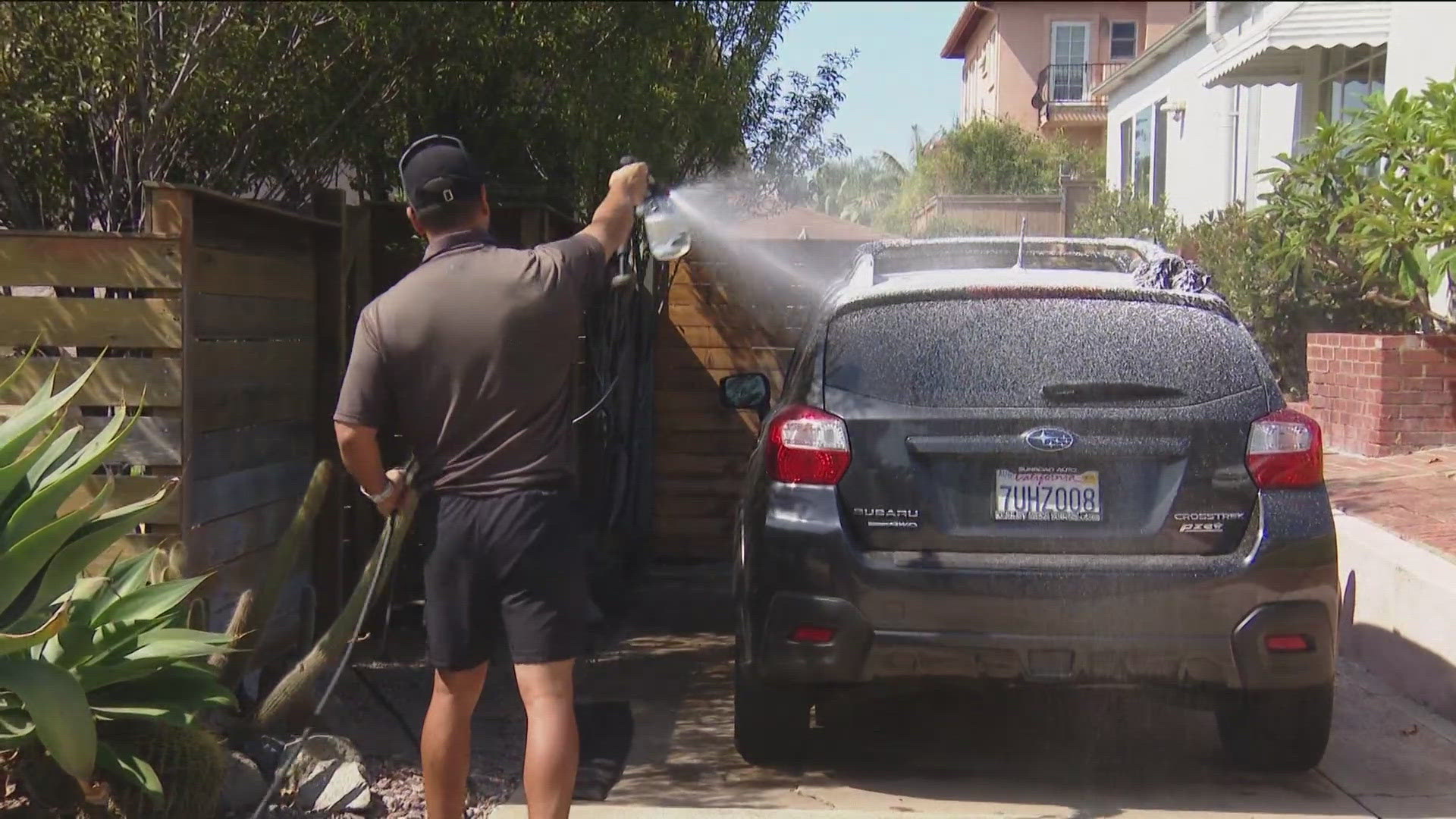SAN DIEGO COUNTY, Calif. — To avoid having someone write 'wash me' on your vehicle, you can either take it to a car wash, use a mobile detail service, or lather up the suds yourself.
Whatever you choose, did you know that the runoff can actually contribute to the water pollution in our county? Project Clean Water has ways to reduce that.
Project Clean Water is an organization dedicated to protecting water quality in San Diego County. They promote countywide initiatives for good watershed health by collaborating with 21 governmental agencies, the County, Port of San Diego, San Diego International Airport, and the 18 incorporated cities within the county.
"Any pollutants that this person is washing off their car, or trash can, are now washing down directly into our storm drain, as you can see here. And storm drains are connected to rivers, oceans, creeks, streams and lakes and they are completely untreated," said Paige Copenhaver, Watershed Protection Program with Project Clean Water.
When it comes to car washing, the dirty water contains soap and chemical cleaners, in addition to gasoline, motor oil and whatever substances you have on your vehicle.
The water washes it off your driveway or the street, and those pollutants contribute to runoff that degrades our water quality and harms our wildlife.
"This is the water that people are swimming in and fishing in and you just don't want all that stuff in your waterways," said Copenhaver.
That's why Project Clean Water has launched the "From Suds to Shores: Wash Your Car Wisely" campaign. This countywide initiative promotes eco-friendly car washing practices to reduce water pollution and reduce water use.
If you're going to wash your car at home, Paige suggests using biodegradable products, using a water hose with a trigger nozzle to control your water use, and using towels to collect the runoff so it doesn't leave your property. There is also an ideal surface type for you to work on.
"If you have a grassy lawn or a gravel area, or even sand nearby or right by your house, you can actually wash your car on that because it's a pervious surface. And so, the water is not going to end up in a storm drain. Just make sure you're not using too much water, so it's not overflowing," stated Copenhaver.
And let this top car washing tip soak into your memory.
"Absolutely do not put it down a storm drain, the best option is to take it back to your house, and dump it down your sink or your bathtub, anywhere that there is a drain that's going to drain into the sanitary sewer system because that water is treated," explained Copenhaver.
But, if you don't want to lather up your own ride, you can always find an eco-friendly pro. Christian Zepeda runs Bo Bax Auto Detail, a mobile business that uses eco-friendly products and practices, like using this barrier, to limit the runoff leaving a client's driveway.
Christian also suggests being mindful of how much soap you are using with each wash to avoid using too much water, which can also lead to increased runoff.
"So, the amount of soap is also very important. If you use too much soap, it's going to require a lot of water to rinse it off. If you don't use enough, it can make it difficult and can scratch the paint, and you have to keep rinsing it, so you don't get water spots from the soap," explained Zepeda.
They also use filtered, deionized, water to avoid water spots.
Shifting gears from runoff to water usage, this detail company is mindful of how important water is in our drought-prone county. Compared to most commercial car washes that on average use up to 40 - 100 gallons of water per wash (which is partly recycled), Christian and Junior have a power wash, specifically for cars, that uses three to seven gallons of water per vehicle. Christian just used a little less than 3.5 gallons in under two minutes.
"Here I can focus on the parts that are dirty, and if I don't need that much water, I don't need to use it," said Zepeda.
So, whether you make your car sparkle yourself or leave it to an eco-friendly business, reduced water usage and the preservation of our county's water health are crucial because only rainwater should enter our streets and storm drains.
"The little things that feel like it can make a difference, if we get more people onboard, and people see how important it is to save water," stated Zepeda.
So use those suds responsibly San Diego.
WATCH RELATED: Using AI to engineer crops to fight climate change

